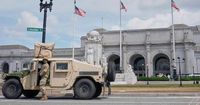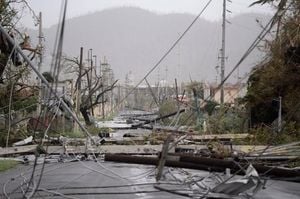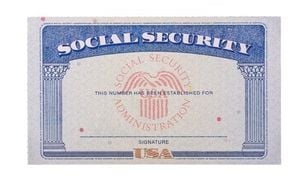Just days after President Donald Trump signed an executive order to federalize Washington, D.C.’s police force and deploy 800 National Guard troops across the city, the nation’s capital has found itself at the center of a fierce legal and political showdown. The move, which Trump justified by citing a “public safety emergency” and “out-of-control crime,” has sparked intense debate, drawn sharp rebukes from local officials, and raised questions about the limits of presidential authority over local governance.
On Monday, August 11, 2025, President Trump’s executive order transferred control of the Metropolitan Police Department to the federal government and set in motion a series of rapid and dramatic changes. According to the Associated Press, the federal government also assumed responsibility for city beautification projects—everything from filling potholes and replacing road medians to clearing homeless encampments on public and federal property.
But city officials quickly pushed back. D.C. Mayor Muriel Bowser called the federal takeover “unsettling and unprecedented,” insisting that violent crime in the city was actually at a 30-year low. “MPD reports to the chief of police, and they are subject to D.C. and local laws, as well as federal laws,” Bowser said, as reported by WTOP. “Nothing about our organizational chart has changed, and nothing in the executive order would indicate otherwise.”
The District of Columbia’s unique status as a congressionally established federal district does give the president more leeway than in other cities, but the Home Rule Act still grants the mayor significant authority, including the power to appoint heads of D.C. agencies. This tension between local autonomy and federal oversight would soon play out in dramatic fashion.
By Tuesday, August 12, the city’s streets had taken on a new look. Hundreds of National Guard members, dressed in fatigues and carrying large duffel bags, reported to the D.C. Armory and began patrolling in sand-colored Humvees, especially near landmarks like the Washington Monument. Some residents, like a visitor from Pennsylvania, told WTOP they were “disturbed” by the military presence. Meanwhile, Terry Cole, head of the Drug Enforcement Agency, was tapped as interim federal administrator for the D.C. police department.
Virginia Governor Glenn Youngkin, a Republican, praised the federal action, declaring on X, “It is a bad day for criminals in Washington, D.C. Terry Cole knows from our partnership with Director @Kash_Patel and General @PamBondi in Virginia that when we back the blue and let police catch criminals—we make our streets safer!”
Wednesday brought a further escalation. According to TVNZ, hundreds of federal law enforcement agents joined the National Guard on D.C. streets, and President Trump announced plans to seek a “long-term extension” of the federal takeover from Congress. “We’re gonna be asking for extensions on that, long-term extensions, because you can’t have 30 days,” Trump said. “We’re gonna do this very quickly. But we’re gonna want extensions. I don’t want to call a national emergency. If I have to, I will.”
That night, 45 arrests were made at checkpoints around the city’s nightlife districts, and crews began clearing homeless encampments near the Lincoln Memorial and Kennedy Center. Volunteers aided homeless residents as they packed belongings in trash bags and shopping carts. Amber Harding of the Washington Legal Clinic for the Homeless told WTOP, “We’ve increased our shelter capacity so people can come in, and outreach workers are out there every day telling people there are some beds that are available, some resources that are available.” Still, the Clinic estimated only about 40 beds were available for the hundreds living on the streets.
Thursday saw the situation grow even more chaotic. Federal agents patrolled busy corridors, and a Justice Department employee, Sean Charles Dunn, threw a Subway sandwich at agents, leading to his firing and a felony assault charge. Attorney General Pam Bondi posted on X, “This is an example of the Deep State we have been up against for seven months as we work to refocus DOJ. You will NOT work in this administration while disrespecting our government and law enforcement.”
Bondi then announced that DEA head Terry Cole would replace D.C. Police Chief Pamela Smith—an assertion that immediately drew legal fire. District of Columbia Attorney General Brian Schwalb issued a legal opinion calling the move “unlawful,” emphasizing that the Home Rule Act did “not authorize the President, or his delegee, to remove or replace the Chief of Police.” Schwalb instructed officers to continue following Chief Smith’s orders, not those of any federally appointed official.
On Friday, August 15, the standoff reached the courts. Mayor Bowser and Attorney General Schwalb announced a lawsuit against the federal government over what Schwalb termed an “attempted hostile takeover” of D.C.’s police department. In an emergency D.C. District Court hearing, Judge Ana Reyes indicated the Trump administration lacked authority to remove Chief Smith, affirming her control under the mayor’s supervision. “A hostile takeover of our police force is not going to happen. Chief Smith remains in control of the police department under the supervision of our mayor. Very important win for Home Rule today,” Schwalb said at a press conference, as reported by The Associated Press.
Despite the court’s decision, Attorney General Bondi ordered D.C. police to assist with federal immigration enforcement, including “locating, apprehending, and detaining” undocumented immigrants. She clarified that Cole would serve as a “designee” of the Attorney General, not as police chief. The White House, meanwhile, maintained that National Guard members were not making arrests but were protecting law enforcement officers and helping deter violent crime.
The partial retreat by the Trump administration interrupted what TVNZ described as “one of the most sweeping uses of federal authority over a local government in modern times.” The episode tested the boundaries of presidential power, with Judge Reyes noting that while the president may have more authority in D.C. than in other cities, “the law likely doesn’t grant the Trump administration power to fully take over city police.”
For many D.C. residents, the sight of federal troops patrolling neighborhoods and the National Mall was unsettling, echoing uncomfortable historical chapters when politicians invoked tough-on-crime rhetoric to justify extraordinary measures in predominantly Black cities. Some protested the increased police presence, while others worried about the precedent set for future federal interventions in local affairs.
As it stands, Chief Pamela Smith remains in charge of the Metropolitan Police Department under the mayor’s supervision, but the federal government’s influence lingers—especially in the realm of immigration enforcement. Whether this episode becomes a blueprint for federal intervention in other cities remains to be seen, but for now, Washington, D.C., has reminded the country of the enduring tension between local autonomy and federal power.




